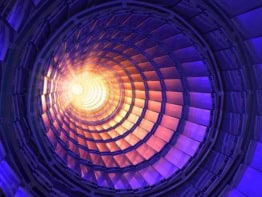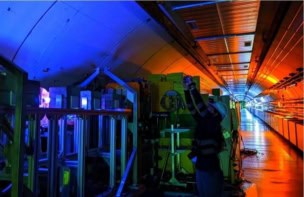The CERN laboratory in Geneva has finally announced when its Large Hadron Collider (LHC) will smash its first beams together -- November 2007. The date was announced today following a meeting of CERN's Council, and comes as part of a schedule drawn up to ensure that high-energy particle beams are produced as soon as possible.
The multi-billion Swiss Franc LHC will be the world’s largest particle accelerator, colliding protons at energies of 14 TeV (14×1012 eV) to generate what physicists hope will be a slew of new particles, such as the Higgs boson and so-called supersymmetric particles. An extremely complicated machine to design and build, CERN was caught out in 2001 when it emerged that the LHC was to cost 30% more than originally envisaged and was also running behind schedule. The committee that reviewed CERN’s operations in the light of these overruns recommended that the collider’s start date be put back from 2005 to 2007, and the lab will have been anxious to ensure that this date does not slip any further.
According to the schedule released today, the last of the LHC’s superconducting magnets — which will guide the protons around the 27km ring — will be installed in March 2007 and commissioning of the machine will then start in August of that year. Two months of collisions beginning in November 2007 will allow the accelerator and detector teams to test their equipment with a low-energy (0.9 TeV) beam. High-energy collisions, at 14 TeV, will then start in Spring 2008 and continue “until a pre-determined amount of data has been accumulated, allowing the experimental collaborations to announce their first results”, according to a press release issued by CERN.
Although CERN is upbeat about its progress, stating that “all of the industrial procurement projects are coming to a conclusion, and the main technical challenges have been met”, it nevertheless remains cautious about potential “logistical hurdles”. “With a project such as the LHC, there are bound to be challenges,” says CERN director general Robert Aymar.



